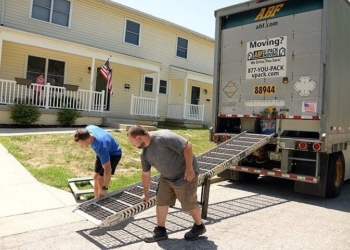When Suzie Humphrey, a military spouse of nearly 30 years, was approached by a junior officer (JO) she mentors, she didn’t expect to be dragged back into the world of PCS logistics. The JO was preparing for their next duty station but had hit a snag with their Personally Procured Move (PPM).
“I’ll admit, I had tuned out this topic,” Humphrey shared. “We stopped moving with the military years ago, and I thought I’d left all those headaches behind.”
She vaguely remembered hearing about new contract negotiations for military moves back in 2020. Just last spring, she sent her active-duty spouse an article about it, joking, “I’m so glad we’re not moving anymore.”
But the JO’s situation got her attention. After submitting their move through Military OneSource, the JO ran into a confusing problem. Their Transportation Management Office (TMO) counselor informed them they had two active move requests: one in the old Defense Personal Property System (DPS) and another in the new MILMOVE system under the Global Household Goods Contract (GHC). The counselor said the DPS submission had to be canceled, leaving the JO no choice but to proceed with MILMOVE.
The JO wasn’t alone. Several of their classmates, also heading to new assignments, reported the same issue. Many had saved PPM quotes under DPS, only to find the new MILMOVE estimates shockingly lower.
“They’re barely breaking even now,” Humphrey said, “and they’re not getting the inconvenience incentive they were promised.”
Humphrey started digging into the details and quickly realized just how much had changed … and not for the better.
The issue: lower rates with fewer choices
According to a Change.org petition led by military spouse, advocate and founder of PCS Like a Pro, Megan Harless, PPM rates under the GHC have dropped by as much as 40%, leaving families with far less financial incentive to handle their own moves. In one example, a family moving 11,000 pounds from California to Arizona initially received a $15,000 estimate under the legacy system. When forced to switch to the GHC’s MILMOVE system, their estimate was slashed to $7,500 — barely enough to cover the cost of the move.
Another family moving from Virginia to Kansas with 16,500 pounds was offered $12,000 under the GHC, compared to $19,800 for a similar move in the opposite direction under the legacy system.
For families who rely on PPMs to offset out-of-pocket expenses or maintain control over their belongings, these drastic reductions are not just inconvenient, they’re unsustainable.
A system designed to disincentivize
What’s behind these lower rates? Under the GHC, HomeSafe Alliance (HSA) calculates PPM incentive payments based on what it claims it would cost the contractor to perform the move. This method is referred to as “dynamic pricing,” and critics argue that this approach intentionally sets rates low to discourage PPMs and steer families into the GHC program.
This practice appears to conflict with the Joint Travel Regulations (JTR), which state that service members should be paid PPM incentives based on the government’s constructive cost, which is the amount the government would pay a contractor for the same move. Harless’s petition calls this a violation, emphasizing that families are being financially forced into a program they didn’t choose.
The broader impact on families
Military families already face unique challenges during PCS moves, from packing up their lives every few years to adjusting to new locations. The ability to choose a PPM has long been a way for families to maintain control over the process, secure their belongings and potentially recoup some money.
Now that choice is being eroded. The GHC’s lower rates and ongoing issues —such as delays, lack of participation from moving agents and reports of service members being asked to pack themselves for what should be a full-service move— have added to the stress.
To date, HomeSafe Alliance has managed fewer than 1,000 shipments, yet it is expected to handle 150,000 domestic moves starting in May 2025. Early reports suggest the system is already struggling to meet demand, raising concerns about its readiness for such a massive increase in volume.
Adding to these concerns, HomeSafe Alliance recently disabled the Facebook Recommendations feature on their page, along with the ability to comment on public posts, limiting public feedback. In a post on Jan. 21, the company encouraged service members to instead use the Department of Defense’s Customer Satisfaction Survey (CSS) to provide feedback. While HomeSafe Alliance stated that the survey ensures feedback goes directly to the DOD for evaluation, the decision to restrict public reviews has raised eyebrows.
Critics argue that the move stifles transparency, as social media has historically provided military families with a platform to openly share experiences and hold companies accountable. By directing feedback into a closed system, families worry that important issues may be harder to bring to light.
The call for change
Advocates are calling on Congress to address these issues by:
- Ensuring PPM rates reflect government costs: Rates should be on par with what the government pays contractors, adjusted for inflation and sufficient for families to afford moving themselves.
- Removing HSA’s influence over PPMs: The PPM program should be managed by the military services, not the GHC contractor.
- Holding the military accountable: Congress must ensure transparency and fairness in the implementation of the GHC, and hold U.S. Transportation Command (US TRANSCOM) accountable for these discrepancies.
Families affected by the new system are encouraged to document their experiences, submit feedback through surveys and contact their federal legislators. Harless’s petition, which has gathered more than 41,000 signatures at the time of this publication, serves as a rallying point for those advocating for change.
Harless summed up the sentiment of many military families: “We shouldn’t ask service members to give up their freedom of choice or come out of pocket just because the system isn’t working as it should.”









































